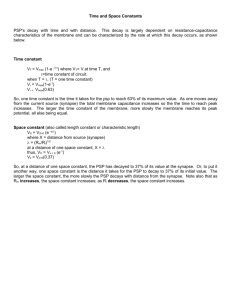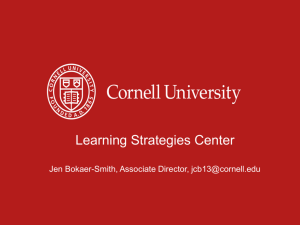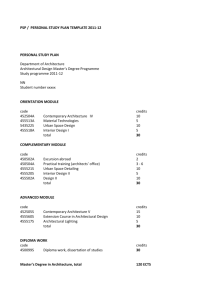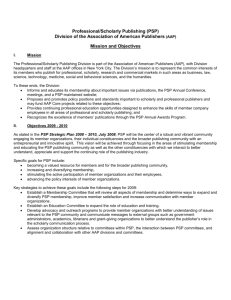Low Moss Throughcare Model
advertisement
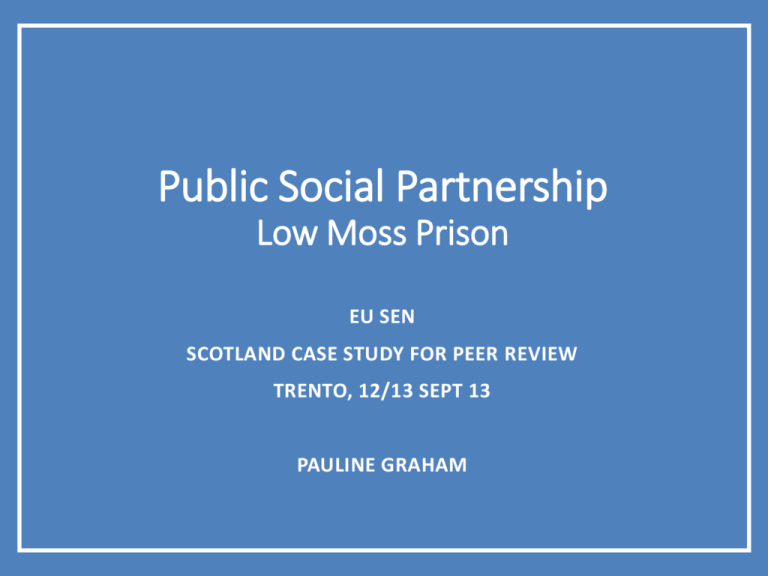
Public Social Partnership Low Moss Prison EU SEN SCOTLAND CASE STUDY FOR PEER REVIEW TRENTO, 12/13 SEPT 13 PAULINE GRAHAM The starting point – for Low Moss PSP ▪ A new prison ▪ Lack of coordination in how Prison based and community criminal services are currently funded and delivered ▪ A partnership ethos ▪ A willingness and desire to do something different ▪ The present economic and political climate ▪ The recommendations from the Christie Commission The nature of the problem ▪ Wider perspective; ▪ Reconviction rates range between 25-53% ▪ SPS estimates £34, 279 pa is spent on prisoners in Scotland ▪ Estimated cost of £80k for every custodial reconviction ▪ HMP Low Moss; ▪ Estimated 700+ liberations per year from Low Moss ▪ A need for consistent access to key supports ▪ A desire for consistent co-ordination in delivery of support ▪ A need for consistent monitoring of the impact of support ▪ PSP & Co production can be the key to improvement The desired outcomes Reduction in reoffending Reduction in re-incarceration High level of engagement with services Outcome 1 Outcome 2 Outcome 3 Outcome 4 Outcome 5 Outcome 6 Outcome 7 Outcome 8 Outcome 9 Sustained or Improved Physical and Mental Wellbeing The ability to access and sustain suitable accommodation Reduced or Stabilised Substance Misuse Improved Literacy Skills Employability prospects increased Improvements in attitudes or behaviour which leads to offending … The ability to access and sustain community support, including financial advice The ability to live independently if they choose Maintained or improved relationships with families, peers and community So what type of behaviours are needed to respond? ▪ Agility and ability to embrace uncertainty ▪ Innovation ▪ Challenging assumptions ▪ Creativity and risk taking ▪ External orientation beyond our own parameters ▪ Diverse leadership approaches The PSP Approach Stage1 Identify opportunities & partners Stage 2 Create a common understanding and way of working Stage 3 Co design the service & Pilot PSP Journey ▪ If the third sector is key to co-delivering through care then we should actively design the solution. Something which can really work ▪ Working together in a structured way which pools knowledge but retains future competition ▪ More detail on the PSP – Ready for Business How can this PSP make an impact? ▪ Co production has the potential to simplify things ▪ A wide range of community options is a great starting point ▪ Maximise the potential for continuity between in prison and community based supports ▪ Take advantage of what’s already there ▪ Build on existing partnerships and establish more The process of data collection and consultation with target group ▪ Gathering information and data ▪ Engaging prisoners and ex prisoners ▪ Engaging third and public sector agencies So what? ▪ The present system is not working ▪ Reconviction rates are still high ▪ Significant cost to the public purse ▪ Significant impact on people’s life's ▪ Significant impact on the lives of families ▪ Significant impact on communities ▪ Good individual projects/initiatives exist but there is a lack of cohesion and coordination ▪ Positive impact on individuals but limited impact on system ▪ Continuity and throughcare are the gateway to success Developing a business case £ - Projected cost saving ▪ We have produced an outline business case to assess the impact we can bring both to prisoners and to the public purse ▪ More work will be done in the pilot phase to explore and monitor the benefit to the wider community 4,000,000 3,500,000 3,000,000 2,500,000 2,000,000 1,500,000 1,000,000 500,000 0 2013/14 2014/15 2015/16 Yr1 2013/14 Yr2 2014/15 Yr 3 2015/16 Estimated no of reconvictions Apply 10% reduction Apply 15% reduction Apply 20% reduction 3-6 months 164 16 25 33 6months to 2 years 126 13 19 26 2-4 years 38 4 6 8 Total 328 33 50 67 No of fewer reconvicts The Model: Core principles ▪ Continuity of support and coordination throughout the prisoner journey ▪ Dedicated one to one support ▪ Shared assessment framework and support planning ▪ Person centred, responsive and flexible ▪ People at the centre of the planning process ▪ Strength of a partnership approach The Model: Key Features ▪ Support plan co-design, monitoring & review – tailored support packages ▪ Through the gate support – support at the most crucial time ▪ Dedicated case worker – Continuity in the assessment and support process post liberation ▪ Direct links with appropriate organisations and services – Commissioning, e.g. health, housing, employment, family supports etc ▪ Continued engagement post liberation – In the locations/services that are key to success ▪ Joint working protocols – Common assessment platform, information sharing and agreed outcomes between agencies The model Person Based Services Throughcare Service Co-ordinated delivery Throughcare needs assessment by dedicated care worker Prisoner released Community based services Community based services Comprehensive assessment, identify needs and appropriate support services Community based services Community based services Community based services Holistic service Initial focus on stability and getting back on track The Prisoner journey ▪ Initial assessment/Core screen process ▪ Case management forum ▪ Make best use of the induction programme ▪ Early prisoner engagement ▪ Jointly develop a support plan ▪ Engage links with key supports/agencies ▪ In prison support – community links ▪ Release ▪ Ongoing contact, monitoring and review Governance and Management PSP Governance Group Lead Agency Throughcare Team Community Based Services Steering Group How can we all help? ▪ We have infrastructure already in place ▪ We can be flexible and responsive ▪ We can facilitate partnerships quickly ▪ We have other added value services e.g. literacy, substance misuse, mental health, employability etc. ▪ We are innovative and imaginative ▪ We are aligned to the ethos underpinning PSP’s ▪ We are person-centred and recovery-focussed ▪ We have proven track record We can all contribute towards.... ▪ Reductions in reconviction and re-incarceration ▪ Positive improvements in substance misuse, health and wellbeing, relationships with families, employability, self esteem & community participation ▪ Stronger partnership and collaborative approach ▪ More targeted and appropriate services ▪ Providing value for money Creating a sustainable initiative ▪ High Priority – primarily need to deliver the goods ▪ Sustaining strong links with key agencies – key to success ▪ Post pilot period – tender and commission ▪ Monitoring and evaluation framework - positive ROI ▪ Collecting the evidence - building evidence to prove a positive impact ▪ Beyond the individual – measure the impact/benefits on wider public sector services and communities What we are achieving ▪ Secured funding and commitment ▪ Keep Informing and involving ▪ Win hearts and minds ▪ Jointly contribute and shape ▪ Garner commitment and sign-up against Memorandum of Understanding Low Moss PSP ▪ Will this result in better outcomes? ▪ Will this result in a reduction in custody? ▪ Will this result in better service delivery? ▪ … it will if we work together and see things in similar ways! EU SEN contact for further information on Public Social Partnership and Low Moss Prison PSP Pauline Graham CEO, Social Firms Scotland pauline.graham@socialfirms.org.uk
